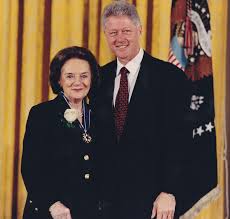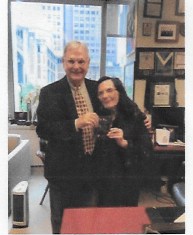A few weeks ago, I participated in a very special event. It was Frances Hesselbein’s 105th birthday celebration on November 1. In observance of the occasion, friends and colleagues gathered for a festschrift in her honor. And this was a different kind of festschrift. Instead of the usual reading of scholarly papers, for this festschrift we all came together (virtually, of course) to share our delight in being with her on this occasion, to tell her how much we love her and value what we have learned from her.
Known worldwide as probably the most influential authority in leadership studies, Frances Hesselbein is the President and CEO of the Frances Hesselbein Leadership Forum at the University of Pittsburgh Graduate School of Public and International Affairs (GSPIA) Johnson Institute for Responsible Leadership, which sponsored the occasion.

And we were no small number (I estimate about 140 people participated). All of us were there to show how much we love Frances and respect her work and the wealth of knowledge she has generously shared with us through the years. And, in particular, to recognize her commitment to sharing her knowledge with the next generation of leaders, a program well demonstrated with the University of Pittsburgh’s Leadership Program in International Affairs. Directed by Julia Santucci, a former senior advisor in the U.S. Department of State, the program is an extracurricular leadership development initiative for GSPIA students from all degree programs who want to pursue careers in the international arena. The need for leadership in this domain has never been greater, and GSPIA is preparing a new generation of leaders to face these challenges and opportunities.

For readers who might not know Frances, the Forum – founded as The Peter F. Drucker Foundation for Nonprofit Management – had been renamed The Frances Hesselbein Leadership Institute in 2012 to honor her legacy and ongoing contributions. In 1998 she was awarded the Presidential Medal of Freedom, the United States of America’s highest civilian honor, by President Clinton for her leadership as CEO of Girl Scouts of the U.S.A. from 1976-1990, as well as for her service as “a pioneer for women, volunteerism, diversity and opportunity.” Her contributions were also recognized by the first President Bush, who appointed her to two Presidential Commissions on National and Community Service. She has received 22 honorary doctoral degrees, written three autobiographies, and co-edited 30 books in 29 languages. Considered one of the country’s most respected experts and greatest leaders in the field of contemporary leadership development (at some point, referring to her role as a teacher and academic, I started calling her the “dean of leadership development studies”), she has since 1966 been the Editor-in-Chief of the award-winning journal, Leader to Leader.
So the event on November 1 was a very special time for those of us who know Frances, and I am pleased to share some of my thoughts about my friendship with her, a friendship that is both personal and professional. With respect to the latter, Frances and I have spent many hours discussing knowledge services – my chosen subject specialty – and those professional conversations are always rewarding. A good example took place at a fine meeting with Frances some eleven years ago, written about in an essay I wrote on October 30, 2009. The essay was titled The Drucker Centenary Approaches: Developing, Managing, and Sharing Strategic Knowledge. This section, which I called “Strategic Knowledge – Defining Moments,” is an excerpt from the longer essay.
For many who work with strategic knowledge, the upcoming Drucker Centenary carries with it something akin to confirmation or affirmation. Considering Mr. Drucker’s contributions, the observances focused around 19 November acknowledge that we are ready to move to a knowledge society. For many of us, we can’t help but be grateful that – as a society – we’re getting beyond the affectation of ignorance that seemed to characterize such a large chunk of our recent past.
Such are the thoughts that come to mind after an evening with colleagues in The Drucker Society of New York, for meeting with us were Frances Hesselbein, Chairman of the Board of Governors of the Leader to Leader Institute, and Bruce Rosenstein, author of Living in More Than One World: How Peter Drucker’s Wisdom Can Inspire and Transform Your Life.
As might be expected from these two expert storytellers, the evening became one of shared experiences (not only from the two of them, but from audience members as well) and ideas flowed freely. Indeed, it would be extremely gratifying to capture all that was discussed but highlights must suffice. And providing highlights is not such a difficult task, since Lee Igel, the group’s leader, used the concept of “defining moments” – those times or events in our lives that guided us to our association with Peter Drucker – to help us focus our thoughts.
Mrs. Hesselbein went back to her childhood to describe her defining moment, telling about how she had determined from her grandmother’s good influence that there is no place in our society (or in the workplace) for prejudice and exclusion. Rosenstein chose as his experience the time when, as he worked toward his book about Drucker’s influence, Drucker used the phrase “living in more than one world,” providing Rosenstein the concept he knew he wanted to convey.
We all have these moments. For some, the defining moment comes when – in a secure profession or field of work, perhaps – there’s a desire to do more, to put one’s self on the line and seek work in which one either supports organizational effectiveness or finds one’s self on the street looking for a job! And, yes, I’m speaking personally here, for as a young librarian my defining moment came when I decided that I wanted to be accountable for my work. The positions in which I had been employed up to that time were not asking enough of me, and I wanted very much to be judged for my professional performance. At about the same time, something led me to specialized librarianship, where my work would either be part of organizational success or I wouldn’t have a job. It was that simple, my defining moment, and it led me down paths I never even knew existed. And, as can be inferred, to a focus on the role of management, individual competencies, and, yes, the influence of a philosophy like Peter Drucker’s, as we seek to achieve organizational effectiveness.
So what we are experiencing – as we think about what Drucker was leading us to – turns out to be something of an affirmation after all, doesn’t it? For those of us looking to understand the place of strategic knowledge in our lives – and our professional roles in developing, managing, and sharing strategic knowledge – it is something of a pleasure to be so affirmed and to learn to recognize those defining moments that lead us onward and upward.

And another professional experience with Frances greatly pleased me. In 2016, my course on “Managing Information and Knowledge: Applied Knowledge Services” (which I teach at Columbia University) was stimulating much enthusiasm with my graduate students. When I told her about their enthusiasm, Frances invited the students to join her for a conference about how leadership and knowledge services interact. It was a very successful event, and even now former students (some of whom are probably reading this) remark about how influential the conference was as they moved into their careers.

November 2019
And since I very carefully refer to this online journal as my “personal” blog (despite the fact that some professional commentary gets through from time to time, as above), I want to describe two other experiences having to do with Frances and me. These are – no question – truly personal. One was for her birthday last year, when she and I went to her favorite restaurant here in New York, Le Colonial. When the meal was finished and the maître d’ suggested taking our photograph, Frances propped the photo of my new great-grandson and the birthday card Andrew Berner had specially designed for her against our Prosecco bottle and a glass, so they would be in the photograph. That, to me, was a gracious gesture typical of Frances (and one which, in fact, I didn’t notice until I saw the photograph).

The second personal story is similar: when I had a big birthday last summer (I’m 25 years younger than Frances), the epidemic prevented any sort of celebration, so friends decided to prepare a “memory book” for me. Frances sent along a favorite photo from one of my visits to her at her office, with the following note: “Happy happy birthday! How I miss our lunches in my NYC office and the delicious, divine, chocolates you would gift me each and every time. Sending you my love and my warmest hug my dear friend.” So, yes, that is getting pretty personal, and I don’t think anyone reading this will mind.
As it turns out, there is a special opportunity to honor Frances Hesselbein’s career and legacy. At the University of Pittsburgh’s Graduate School of Public and International Affairs, the mission is to develop and inspire current and future leaders. A fundraising campaign to celebrate significant milestones of the Hesselbein Forum and of Frances herself has been established. The campaign – designed to honor the living legacy of Frances Hesselbein – is described at https://engage.pitt.edu/project/23426 and contributions are very welcome.
Leave a Reply